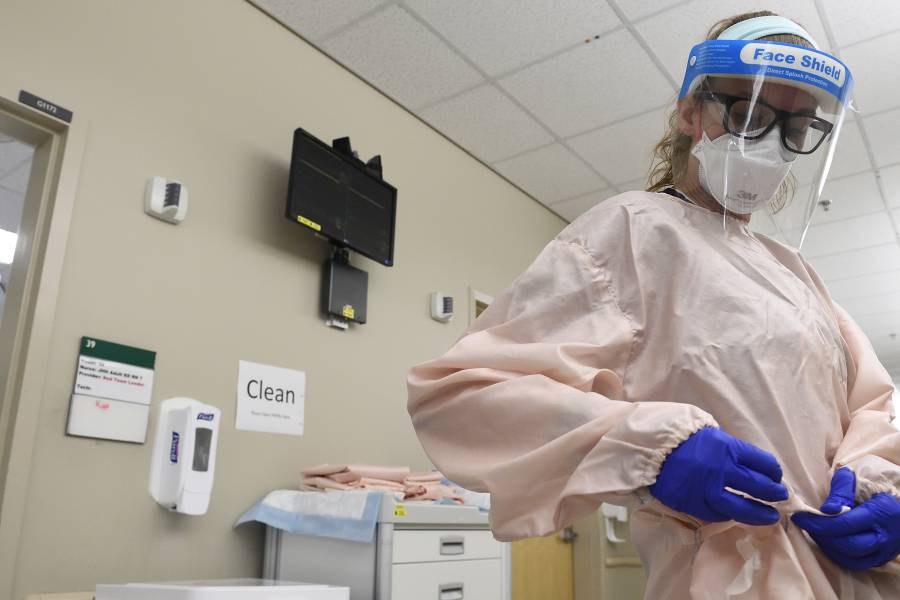Health care workers have been put through the wringer during the COVID-19 pandemic. In the early days of lockdown, we watched in awe as they cared for the sickest patients, putting themselves in harm's way for months before vaccines became readily available. Today, they are still deep in the trenches even as the omicron surge wanes, facing hospitalization and death rates that rivaled some of the pandemic's darkest days.
How are they doing it? What keeps nurses and doctors coming back to the frontlines every day? Sharing insights from her research is Kathleen Sutcliffe, a Bloomberg Distinguished Professor who studies how organizations and their members cope with uncertainty. She says that, in part, health care workers are relying on their past experiences: They are adept at adapting to stressful, life-or-death situations and that has helped them make it through the COVID-19 crisis.
But that skill can come with a cost: Sutcliffe warns that while responding to adversity can propel workers to achieve their best work, it can also fuel widespread exhaustion.
"Just because we've seen resilient responses, that doesn't mean people aren't going to get burned out by chronic workplace stress that has not been successfully managed," says Sutcliffe, who holds appointments at the Carey Business School, School of Medicine, Bloomberg School of Public Health, and School of Nursing. "That can lead to feelings of exhaustion, mental distancing, cynicism, negativity, and a decrease of professional efficacy—which means you can't really do your job successfully."
Read on for more insights from Sutcliffe.
What does resilience look like in the workplace?
A common line of thinking is that resilience is the capability of a strained person to recover and bounce back from adversity or high stress. But we should think about resilience not as a state of return, but as an adaptive process that occurs over time.
This model for resilience highlights four major elements. The first is the ability to accept and face reality: To see a situation for what it really is and grapple with that. The second element is finding meaning and purpose: Why are we doing this work, why does it matter, how does it make a difference? Third is the ability to improvise quick decisions and workarounds by recombining resources. The final element is an underlying attention to physical and mental fitness. Doctors and nurses need to be hardy—emotionally, cognitively, and physically as well.
I'll add another thought I've read about and seen in my own research, which is that the essence of human resilience is to be more concerned with the future than the past, and to use one's ability to create meaning and hope. I don't mean that in the sense that everything's going to turn out rosy—but a certainty that things will eventually fall into place and make some sort of sense. When humans are resilient, they emphasize what remains, what they have in front of them, rather than what's lost.
How can we think about those concepts as they apply to high-stress health care jobs during COVID-19?
We know that resilience is more the norm than the exception in human beings. COVID-19 feels violently disruptive and abnormal in our lives, but unexpected events happen all the time, things that are new or chaotic—that's the default of life, and humans are attuned for that. What we're facing right now with COVID-19 is a prolonged relentless crisis, but we do have these natural abilities that have equipped us for other crises.
We have data from previous pandemics, such as SARS and MERS, suggesting that health care workers with significant exposure to working with patients with those diseases reported higher rates of anxiety and depression and traumatic stress, and a smaller proportion of workers were found to experience longer-term psychological effects. Early studies on COVID-19 suggest that the trends will be similar here. There's one from Mount Sinai, which measured stress levels of health care workers via Apple Watches, and found that those with high resilience and strong emotional support were better protected against the stress.
What's also interesting—and counterintuitive—is that we've also seen some studies showing certain frontline workers experiencing better mental health outcomes, in part because the crisis has fueled a stronger sense of meaning and purpose. So we have to be really careful when we assume everyone is responding to adversity in the same way.
Many health care workers were already in high-stress jobs before COVID-19. Would they be better equipped to handle the stress because of their past experience?
Studies of nurses repeatedly show how brilliantly resilient they are, because they're constantly facing challenges, resource constraints, ineffective communication—it's a dynamic context that demands improvisation all the time. No one's suggesting that's easy, or necessarily productive or effective in the longer term. But nurses are known to be very adept at developing workarounds and dealing with insufficient resources. So, in some cases, yes, health care workers during COVID-19 are really working with a strong foundation of problem-solving skills they've built from past experiences.
In the early days of the pandemic, when we were facing all the complications with personal protective equipment and lack of resources, we saw remarkable creativity and innovation. Some changes will likely stick around, such as the increased use of telehealth. Health care systems have also found many ways to redeploy resources. Some of my colleagues who are in administrative positions in medicine are now being assigned to do other things. For the most part, they're excited about it because they're learning more about their systems and they're making connections and relationships that are bound to help them in the future.
How can health care workers deal with the burnout?
On the individual level, we know just how important it is to make sure you're doing things to protect your health, both physical and mental—that you're getting enough sleep, making time for relaxation, that you have emotional support systems, etc.
And all the literature out there suggests they have to find meaning in what they're doing. It's really important to see the bigger picture, not just the small task you're doing at the moment, but how you're contributing more broadly and more globally. To find something you can sink your teeth into and be engaged with and develop some competence around that.
What can leaders or managers do?
They can make sure they're making time and space for employees to talk openly about the challenges and stresses they're facing, and not just ignoring the situation. Employees absolutely need opportunities to express their emotions.
As far as work flow during COVID-19, there needs to be a structure in place that prioritizes the most important actions and can jettison the less important. What is necessary right now and what can we do away with? There needs to be discussion of: How do we frame things so our actions are meaningful?
I also think there needs to be acknowledgment that this is an emerging, constantly evolving situation and we simply do not have all the answers. Firm, inflexible stances and blanket statements just aren't helpful. "This is what we know right now, this is what we have to do, but we'll regroup later and figure out what next week or next month looks like."









